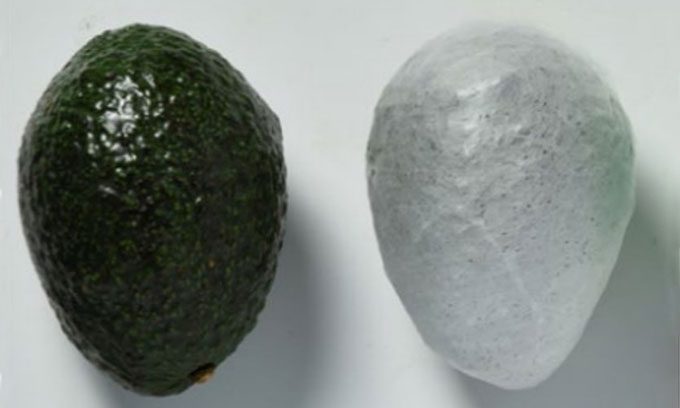The coating developed by Rutgers School of Public Health can be sprayed onto food, washed off before eating, and decomposes in just three days in soil.
Researchers at the Rutgers School of Public Health in New Jersey have developed a coating that can be sprayed onto food, extending its freshness by 50%, as reported by Mail on June 21. They hope this plant-based coating will soon replace plastic wrap in supermarkets.

The coating sprayed onto food helps prevent spoilage and bruising. (Photo: Rutgers School of Public Health)
“We know that we need to eliminate oil-based food packaging and replace it with something more sustainable, biodegradable, and non-toxic. At the same time, we wondered if we could create food packaging that extends shelf life, reduces food waste, and increases food safety,” said Philip Demokritou, a member of the research team.
“We discovered a scalable technology that allows us to transform biopolymers (which can be derived from food waste) into smart fibers that directly coat food. This is part of a new generation of smarter, greener food packaging,” he added.
The packaging uses fibers made from polysaccharides – the most abundant carbohydrates found in food. These fibers are drawn from a heating device similar to a hairdryer, then wrapped around foods like avocados and steaks.
The fibers are infused with essential oils from thyme, citric acid, and nisin – natural antibacterial ingredients that can combat spoilage and pathogens such as E. coli and Listeria. The coating not only helps prevent food spoilage but is also sturdy enough to avoid bruising, the research team stated.
When preparing to eat the food, the coating can be easily washed off with water, and it decomposes in soil within three days. When tested on avocados, the experts found that the coating helped extend the shelf life of the fruit by an additional 50%.
The new method is also scalable for more widespread application. While current manufacturing techniques produce fibers at a rate of 0.01 grams per minute, the new technique produces fibers at a much higher rate of about 0.2 grams per minute.
The research team hopes their coating will help reduce plastic use in supermarkets. “Over the past 50-60 years, during the ‘plastic age,’ we have released up to 6 billion tons of plastic waste into the environment. These materials decompose very slowly out there. Tiny plastic particles are infiltrating our drinking water, food, and the air we breathe,” Demokritou stated.


















































